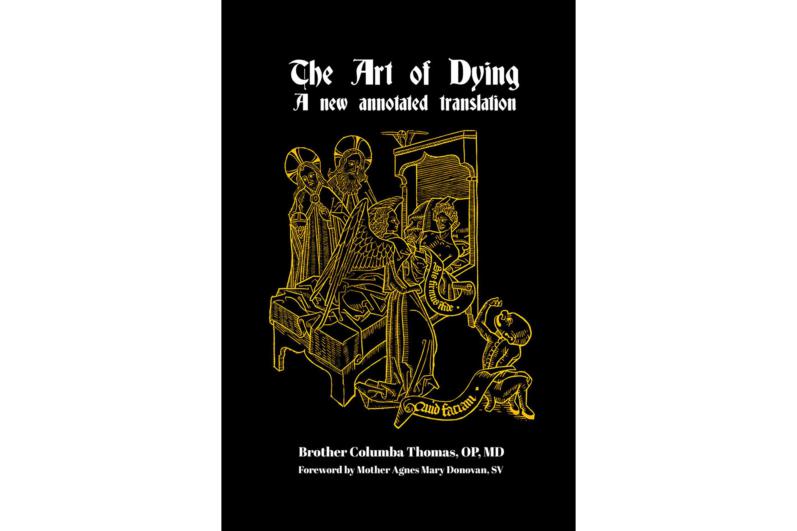New annotation of ancient text on dying fails to fill today's acute need
"The Art of Dying: A New Annotated Translation." Translated with introduction and notes by Brother Columba Thomas, OP, MD. National Catholic Bioethics Center (Philadelphia, 2021). 143 pp., $14.95.
As both a medical doctor and a Dominican brother studying for the priesthood, Brother Columba Thomas is an appropriate guide to this new annotation of the 15th-century text, "Ars moriendi" ("The Art of Dying").
In his concise and clear introduction, Brother Thomas identifies the key principles of the "Ars moriendi." These include the priority of the soul over the body, an emphasis on liturgy and sacramental care and a sharp awareness of the spiritual struggles the dying person faces.
Those spiritual struggles are the main focus of the "Ars moriendi" -- illustrated with dramatic prints -- that warn the dying person (portrayed as a man and referred to as him) about the temptations of the devil, and to encourage him with the inspirations offered by the good angel, remedies that help him remain focused on God and the next life.
The first temptation is against faith, "the foundation of all salvation, and without it no one can be saved." But, the angel argues, the devil is a liar and must be resisted. You must "firmly believe all the things commanded by the church, since holy church is guided by the Holy Spirit and unable to commit error."
The second temptation is "to despair, which opposes the hope and confidence he should have in God." The angel counters that despair "is worse and more damnable than all sins."
The third temptation is to impatience, "which opposes the charity by which we are held to love God above all things." Impatience, the angel reminds him, is harmful because "by making a person restless and perturbed, it turns him away from God."
The fourth temptation by which the devil threatens "the devout, religious and faultless" is an appeal to vainglory -- vanity and spiritual pride. The angel counters that "Nothing good comes from yourself, as the Lord says: 'Without me you can do nothing' (Jn 15:5)."
The fifth temptation is to avarice, "excessive preoccupation with the passing things of this world: wives and worldly friends, material wealth and other things they have loved greatly in life." The angel counsels him to "place totally behind you all the things of this world, since remembering them surely brings nothing of salvation but greatly impedes it."
The "Ars moriendi" concludes with a collection of prayers (some of which can be traced back to the seventh and eighth centuries) that "emphasize God's mercy, the power of Christ's passion and cross, and the role of the saints and angels as intercessors for souls."
Brother Thomas commends the "Ars moriendi" "as a catechetical guide, as a unique resource for meditations and prayers that are rooted in the Catholic liturgical tradition and as a reference for the many sacramental and liturgical resources available to Catholics at the end of life."
Brother Thomas notes that our current context is, to some extent, strikingly similar to the time when "Ars moriendi" was written. Many Catholics lack access to the sacraments, a situation that was particularly noticeable during the COVID-19 pandemic. There is a general lack of catechesis and a neglect of the sacrament of penance.
Lay faithful "have a limited understanding of the basic tenets of the faith" and "the experience of dying can sorely test a person's faith in God and in the promise of salvation." Contemporary end-of-life care, with its focus on multiple health care options, "threatens to distract the faithful from true preparation for death."
One cannot argue with Brother Thomas' description of the similar pastoral needs between our time and that of the "Ars moriendi." However, that book reflects a medieval piety that had "a robust belief in the reality of life after death and the efficacy of the sacraments."
Contemporary spirituality is different; it is less devotional, more psychologically nuanced, informed by a different human anthropology and has a more holistic understanding of the unity of mind, body and soul. It is hard to imagine a Catholic chaplain urging a dying person to renounce "house or brothers or sisters or father or mother or wife or children or lands" to enter into eternal life.
The "Ars moriendi" was written to help people prepare for death. It is still an acute need of the Catholic faithful: to remember that we are finite creatures who will die, to prepare spiritually as well as medically and financially for our deaths, to avail ourselves of the sacraments of the church.
While this new annotation provides much historical and theological information, it reflects such a radically different sensibility that it fails to fulfill its potential to offer meaningful pastoral support.
- - -
Also of interest: "Memento Mori: Prayers on the Last Things" by Sister Theresa Aletheia Noble, FSP. Pauline Books and Media (Boston, 2021). 384 pp., $24.95.
"Keep at it, Riley! Accompanying My Father through Death into Life" by Noreen Madden McInnes. New City Press (Hyde Park, New York, 2022). 252 pp., $22.95.
- - -
Linner, a spiritual director, freelance writer and reviewer, has a master's degree in theology from Weston Jesuit School of Theology.



















